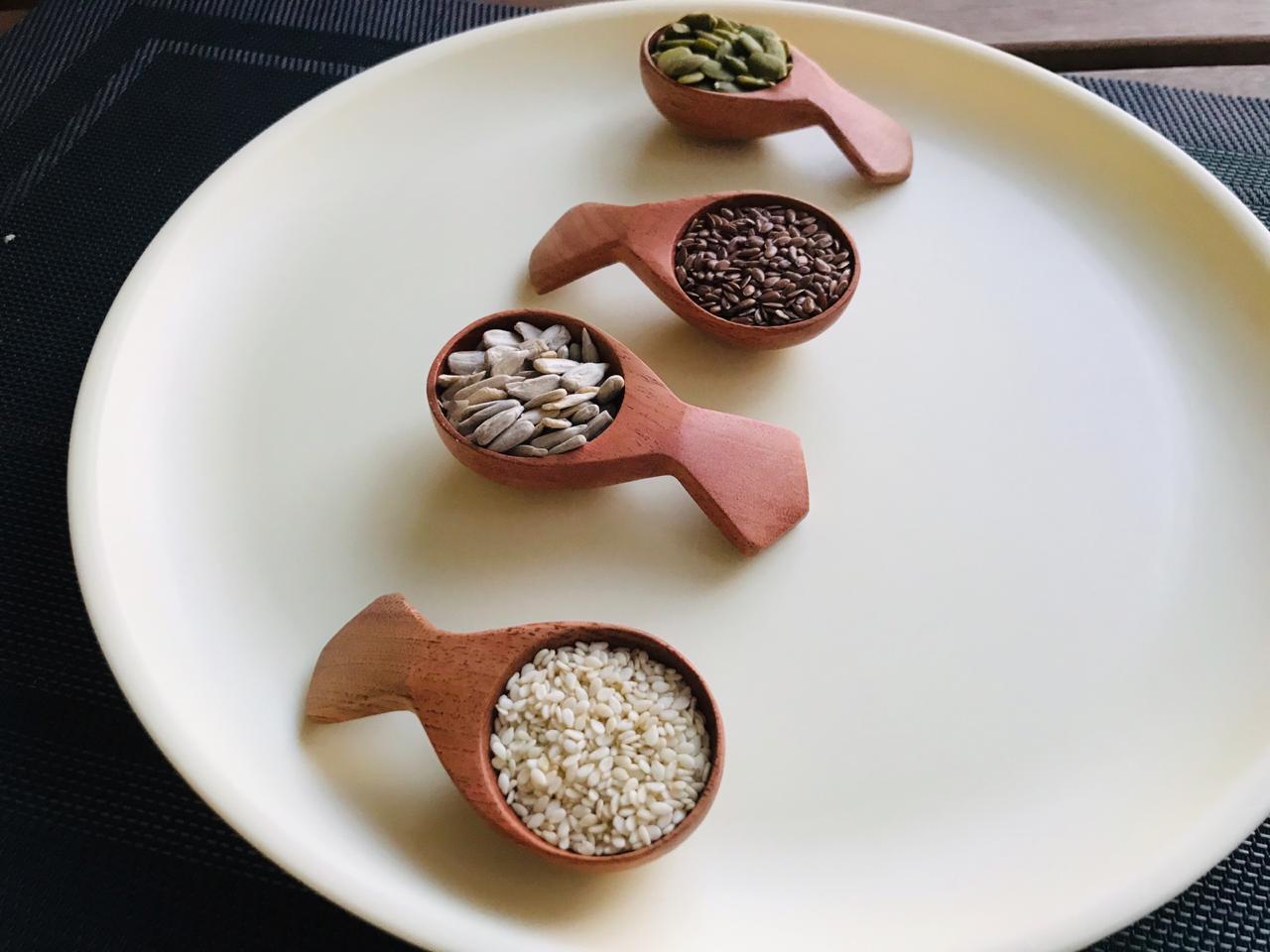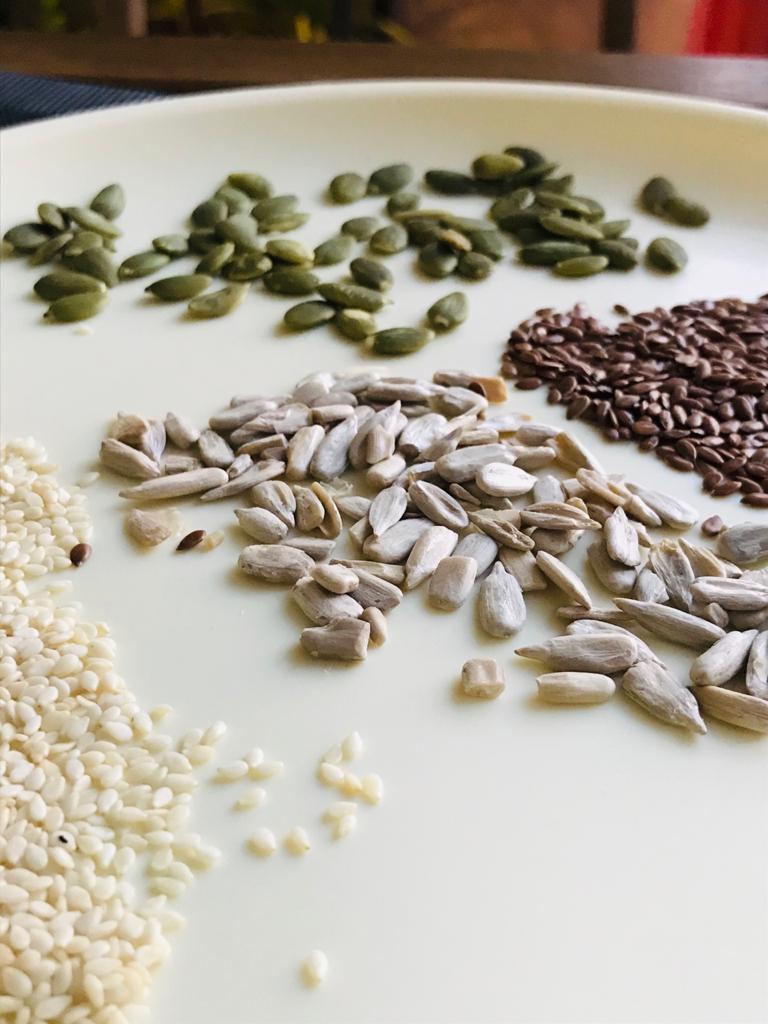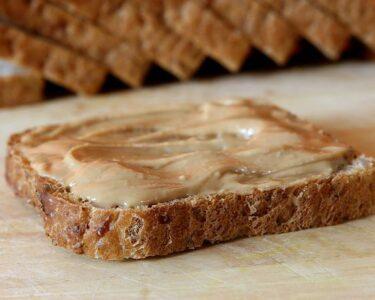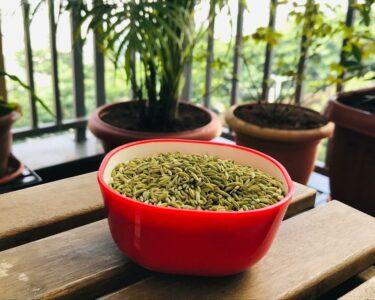Seed Cycle is the latest trend among women for curing PCOD/PCOS and Infertility associated with it. One of the prominent symptoms of PCOD/PCOS is delayed periods, abnormal bleeding, heavy clots, and prolong bleeding periods. The hormonal imbalances usually delay the periods to 2 months, 6 months, and in some cases even to 1 year. Period irregularities in turn lead to Weight gain, Heart Disease, Osteoporosis, Arthritis, Diabetes, Ovarian/ Uterine Cancers, Infertility, etc. Including the Seed Cycle concept in the Indian diet plan for PCOD/PCOS may help in improving the menstrual health of a woman. Though the concept of seed cycling lacks proper scientific evidence to support it, still many have shown improvement in regularising periods with this. The Seed Cycle concept is documented completely based on people’s experiences. Nevertheless, let us understand what is Seed Cycle.
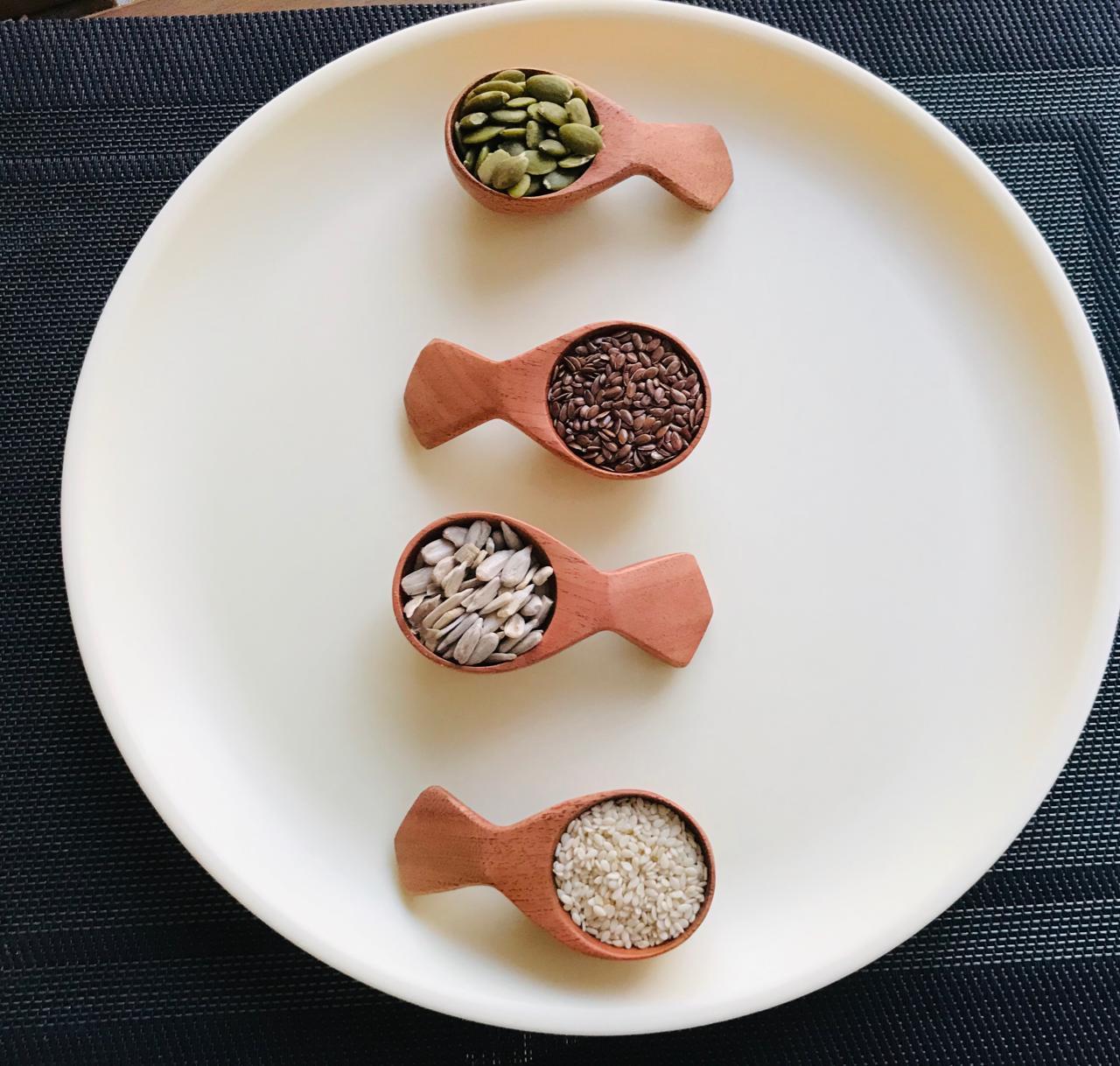
What is Seed Cycling?
Seed Cycling is the practice of eating specific seeds during the two main phases Menstrual Cycle (follicular and luteal Phase) to help promote the healthy balance of Estrogen and Progesterone levels.
The practice claims that it can improve certain hormonal balance, regularise periods, reduce acne, and boost fertility. This concept lacks proper scientific evidence to back up but few studies have shown that the seeds have improved the menstrual health of women.
Getting periods every month is a natural phenomenon for Women. But, this process becomes Painful and Uncomfortable for many women. These issues can arise due to underlying hormonal imbalances. This can be problematic for women of any age. Medicines will only help to reduce the symptoms but to cure the root cause Healthy Diet and Healthy Lifestyle is the only solution. Hormone Replacement Therapy (HRT) is generally prescribed by doctors which has many side effects.
So, Seed Cycle can help to regularise the periods naturally with no side effects.
Let us first understand what happens in a regular menstrual cycle.
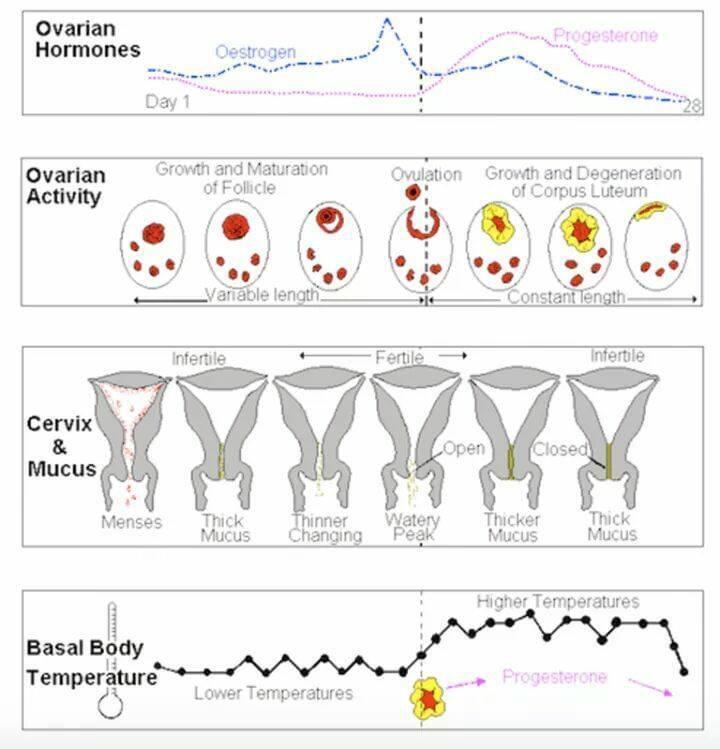
Follicular Phase – (Day 1-14)
The follicular phase starts from the first day of your period. It starts with a signal from Hypothalamus to the Pituitary gland to release Follicle Stimulating Hormone( FSH). This hormone stimulates your ovaries to produce 5-20 small sacs called follicles. Each follicle contains an immature egg.
Only the healthiest egg will be matured (sometimes, in a few women 2 mature eggs can also be formed). The rest of the follicles are reabsorbed in the body.
The maturing Follicle, in turn, increases the estrogen level in the body, which thickens the uterine lining of the uterus. This creates a nutrient-rich environment for growing embryos if implantation occurs.
The average follicular phase lasts for 16 days. It can range from 11-27 days depending on the person’s menstrual cycle.
Ovulation Phase – (Day 14)
Rising estrogen levels during the follicular phase trigger your pituitary gland to release Luteinizing Hormone (LH). This starts the ovulation process.
Ovulation happens when your ovary releases a mature egg. The egg travels down the fallopian tube towards the uterus to be fertilized by sperm.
This is the most fertile period to get conceived. Ovulation happens at day 14 if you have 28 days cycle. It lasts about 24 hours and later gets dissolved if it doesn’t get fertilized.
Luteal Phase – (15-28)
After the follicle releases its egg, it changes into Corpus Luteum. This structure releases hormones, mainly progesterone and some estrogen. This rise in hormones keeps the uterine lining thick and ready for a fertilized egg to implant.
If a woman gets pregnant then Human Chorionic Gonadotropin (HCG) is produced in the body which maintains the Corpus Luteum and keeps the uterine lining thick.
If a woman does not get pregnant, then the corpus luteum gets shrink away and gets reabsorbed. This causes a decrease in the level of progesterone, which leads to the onset of the period. The uterine lining will be shed during the periods.
The Luteal Phase lasts for 11- 17 days, with an average of 14 days.

What happens during Hormonal Imbalance?
When there are hormonal imbalances between Progesterone and Estrogen, the periods get delayed or completely absent. The periods will be painful with heavy bleeding and prolonged bleeding. Usually, there will be high estrogen and low progesterone during PCOD/PCOS. Higher estrogen causes tender breasts, mood swings, weight gain, hair loss, Fibroids, Endometriosis, Ovarian Cysts, Cysts in the breast.
Low Progesterone causes Anxiety, Difficulty in sleeping, Headaches, infertility, and miscarriages.
What causes hormonal Imbalances?
- Poor Diet.
- Poor sleep.
- Poor Hydration.
- Lack of Exercise.
- Stress.
- High Alcohol or Caffeine Consumption.
- Hereditary (Rarely)

How does seed cycling work?
To balance the hormones Naturopathy has come forward with this beautiful concept of seed Cycling. Indian diet plan for PCOD/PCOS suggests to include healthy fats and micronutrients for managing PCOS/PCOD symptoms. Taking specific seeds provides vitamins, minerals, and oils needed for the production, release, metabolism hormones in the body. It also supports the timely production and clearance of the hormones from the body.
Follicular Phase –
To keep estrogen levels in balance, It is cycled with Flax seeds that contain phytoestrogens that adapt to the body’s estrogen needed during this phase. If estrogen levels get too high, the lignans in the flaxseeds can bind to the excess and eliminate it out of the body.
Another seed that is cycled in this phase is Pumpkin Seed. Pumpkin seeds are high in Zinc which supports progesterone production in the next phase.
Omega -3 fatty acids present in the seeds reduce inflammation and maintain reproductive Functions. (1) (2) (3) (4) (5) (6) (7)
Luteal Phase –
During, this phase, we cycle with Sesame Seeds, which are high in Zinc and Selenium, and block excess estrogen. This is very essential for balancing hormones in this phase. Another seed is Sunflower seeds, which are high in Vitamin – E and required to support Progesterone levels.
Gamma-Linolenic Acids (GLA’s) present in the seeds are also beneficial during this phase to boost progesterone and reduce inflammation. (8) (9) (10) (11) (12)
How to do seed Cycle?
In the Follicular phase (Day 1 -14) add into your diet daily :
- One tablespoon of freshly ground flaxseeds.
- One tablespoon of Pumpkin Seeds.
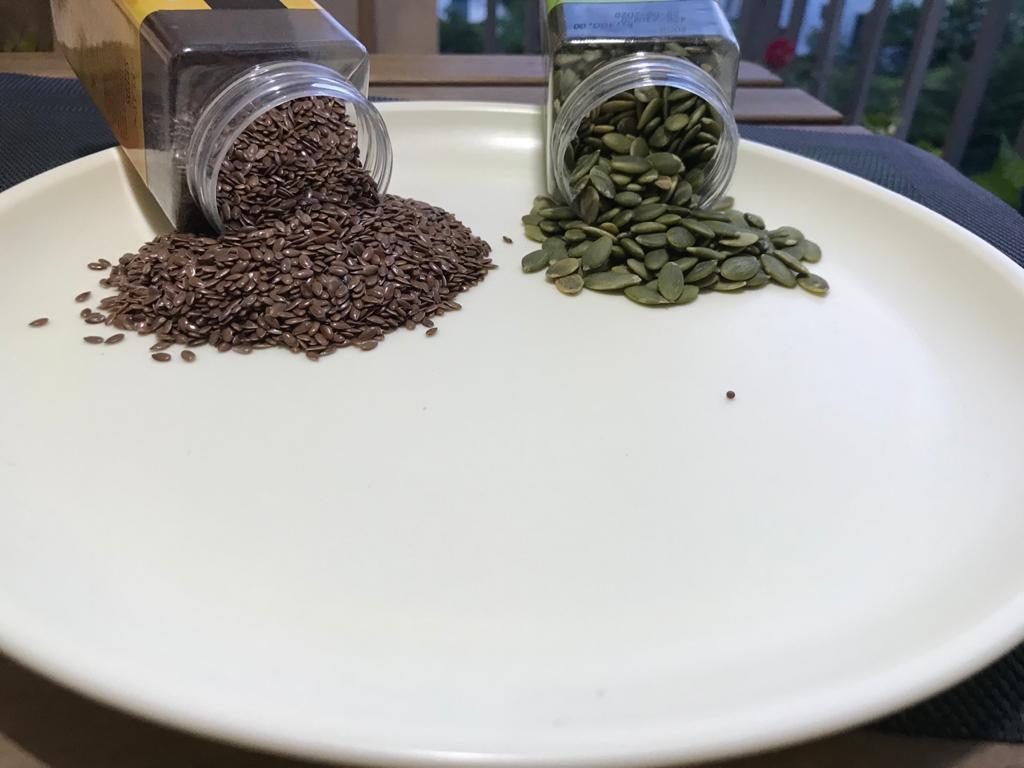
In the Luteal Phase (Day 15- Next Menstrual Period) add into your diet daily :
- One Tablespoon of Sesame Seeds.
- One tablespoon of Sunflower Seeds.
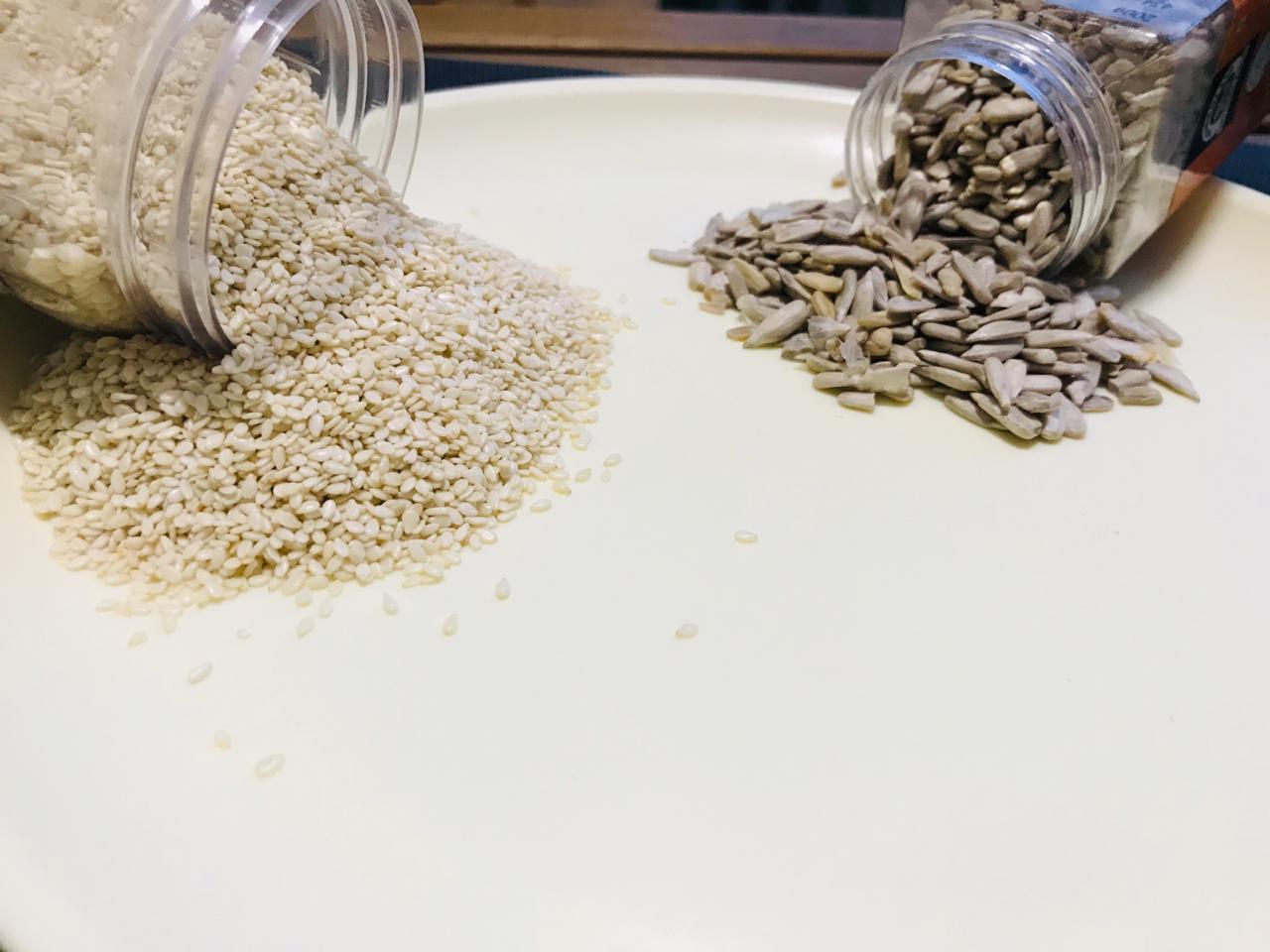
Remember day 1 is the first day of your period. Repeat this cycle until you get periods. Once you get the period, and if you are in the Luteal seed cycle then stop those seeds and start with the cycle of the Follicular seed.
The following Tables show the nutritional value of the four seeds
| Nutritional Parameters (per 100 grams) | Flax seeds (Alsi) | Pumpkin Seeds (Kaddu ke beej) | Sesame Seed (Til ke beej) | Sunflower Seeds (Suraj Mukhi ke beej) |
| Energy | 530 KCal | 584KCal | 563KCal | 280KCal |
| Protein | 20.3 grams | 24.3 grams | 18.3 grams | 19.8 grams |
| Carbohydrates | 28.9 grams | 15.6 grams | 25.0 grams | 17.9 grams |
| Fat | 37.1 grams | 47.2 grams | 43.3 grams | 52.1 grams |
| Calcium | 170 mg | 50 mg | 1450 mg | 280 mg |
| Phosphorous | 370 mg | 830 mg | 570 mg | 670mg |
| Iron | 2.7 mg | 5.5 mg | 9.3 mg | 5 mg |
| Zinc | 4.34mg | 7.81mg | 7.75mg | 5mg |
| Selenium | 25.4 mcg | 9.4 mcg | 34.4 mcg | 53.0 mcg |
| Thiamine | 0.23 mg | 0.273 mg | 0.23 mg | 0.86mg |
| Riboflavin | 0.07 mg | 0.153 mg | 0.07 mg | 0.20 mg |
| Niacin | 1 mg | 4.987 mg | 1.0 mg | 4.5 mg |
| Choline | – | 63 mg | – | – |
| Vitamin E | 19.95mg (Tocopherol Gamma) | 35.10 mg
(Tocopherol- Gamma) |
0.25mg
(Tocopherol – Alpha) |
35.17 mg
(Tocopherol – Alpha) |
| Cholesterol | – | – | – | – |
Reference – Nutritive Value Of Indian Foods by C.Gopalan, B.V.Rama Sastri, S.C. Balasubramanian.
| Nutritional Parameter
(Per 100 grams) |
Flax seeds (Alsi)
|
Pumpkin Seeds (Kaddu ke Beej)
|
Sesame Seeds(Til)
|
Sunflower Seeds (Sooraj mookhi ke beej)
|
| Omega – 3 Fatty Acids | 22812 mg | 181 mg | 375.6 mg | 73.91 mg |
| Omega – 6 Fatty Acids | 5911 mg | 20703 mg | 21372.2 mg | 23047.8 mg |
Reference – https://nutritiondata.self.com/facts/nut-and-seed-products/3076/2
How to Include the seeds?
You can have the seeds in Raw form. Soak the seeds overnight and have it in the morning. Chew them properly and drink a small glass of warm water after that. You can put the soaked seeds on your meal and eat them.
If you do not like it to chew the seeds then you can grind or crush the seeds and sprinkle them on your-
- Smoothie
- Buttermilk/Chaas/Lassi
- Curd
- Salads
- Oatmeal
- Cereal Porridge
- Green Vegetable Juice.
- Poha
- Upma
- Rotis
- Dals
- Idly
- Dhokla.
Points to Consider before starting Seed Cycle
- Please ask your health care provider or gynecologist and qualified nutritionist before going with the seed cycle.
- If you find spotting in between cycles, abnormal bleeding, Heavy clots than usual, Bleeding more than 7 days, High Blood pressure, Palpitations, and anxiety please consult the doctor immediately.
- If you are allergic to either of the seeds, please do not practice the Seed Cycle.
- Start seed Consumption with half a teaspoon in quantity. Let the body adjusts with the seeds and gradually increase it to 1 tablespoon.
- Do not expose the seeds to heat like roasting or cooking along with curries. Heating may damage healthy fats and nutrients from the seeds which are essential to balance the hormones. Use the seeds as sprinklers.
- Grind the seeds freshly before consuming.
- You can also grind and store the seeds separately for a week. It must be refrigerated in an airtight container( preferably glass). Label the bottles and keep them in fridge.
- Big NO to Plastic containers, glass and spoons.
- Do not swap the seeds like Sunflower seeds in the follicular phase and flax in the luteal phase.
- Keep yourself well hydrated throughout the day.
- Do not follow the Seed Cycle if you have regular and normal periods.
- Practicing Seed Cycle regularly for 3-4 months will show the improvement in menstrual health.
- Only Practicing seed cycle might not help in balancing hormones. A well balanced Indian diet plan for PCOD/PCOS, Good sleep, and Exercise are must to do things to have a proper hormonal balance and regular periods.
- Avoid ultra processed foods, Junk foods and refined Carbohydrates while following Seed cycle in the Indian diet plan for PCOD/PCOS.
Take Away Message
Seed Cycling involves eating four seeds – Flax, Pumpkin, Sunflower, and Sesame Seeds in different phases of the Menstrual Cycle. Many women claim that they have been benefitted from the seed cycling practice. It has helped them to balance certain hormones, boost fertility, regularise periods, and ease menopause symptoms. Though the evidence to back up the Seed Cycle concept is weak, still including seeds in your diet boosts your intake of vitamins and minerals. Seeds are also associated to lower certain cancers, improving heart health, Manage Cholesterol, and Diabetes. Include Seeds in your diet along with Indian Balanced Diet Plan for PCOD/PCOS to improve menstrual health.

